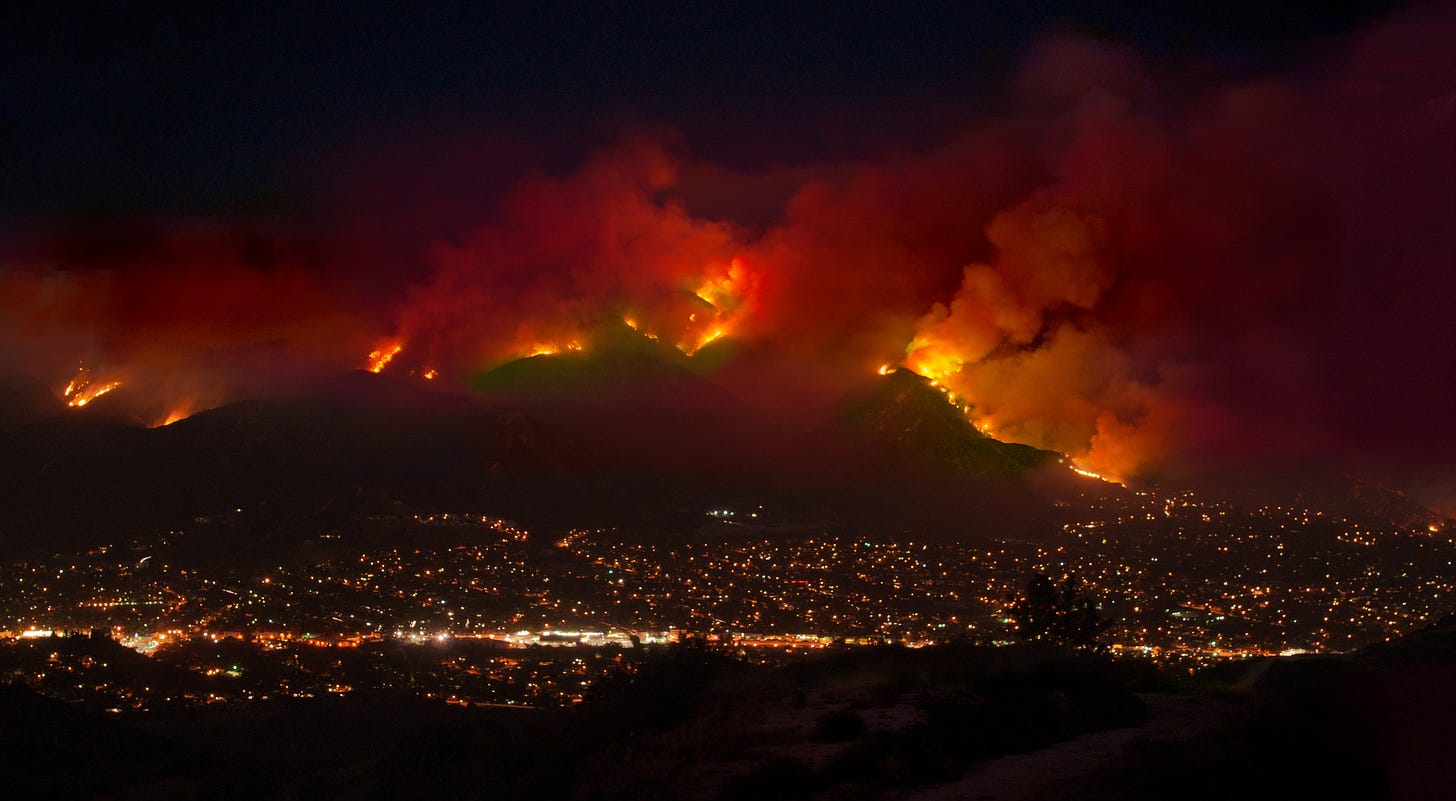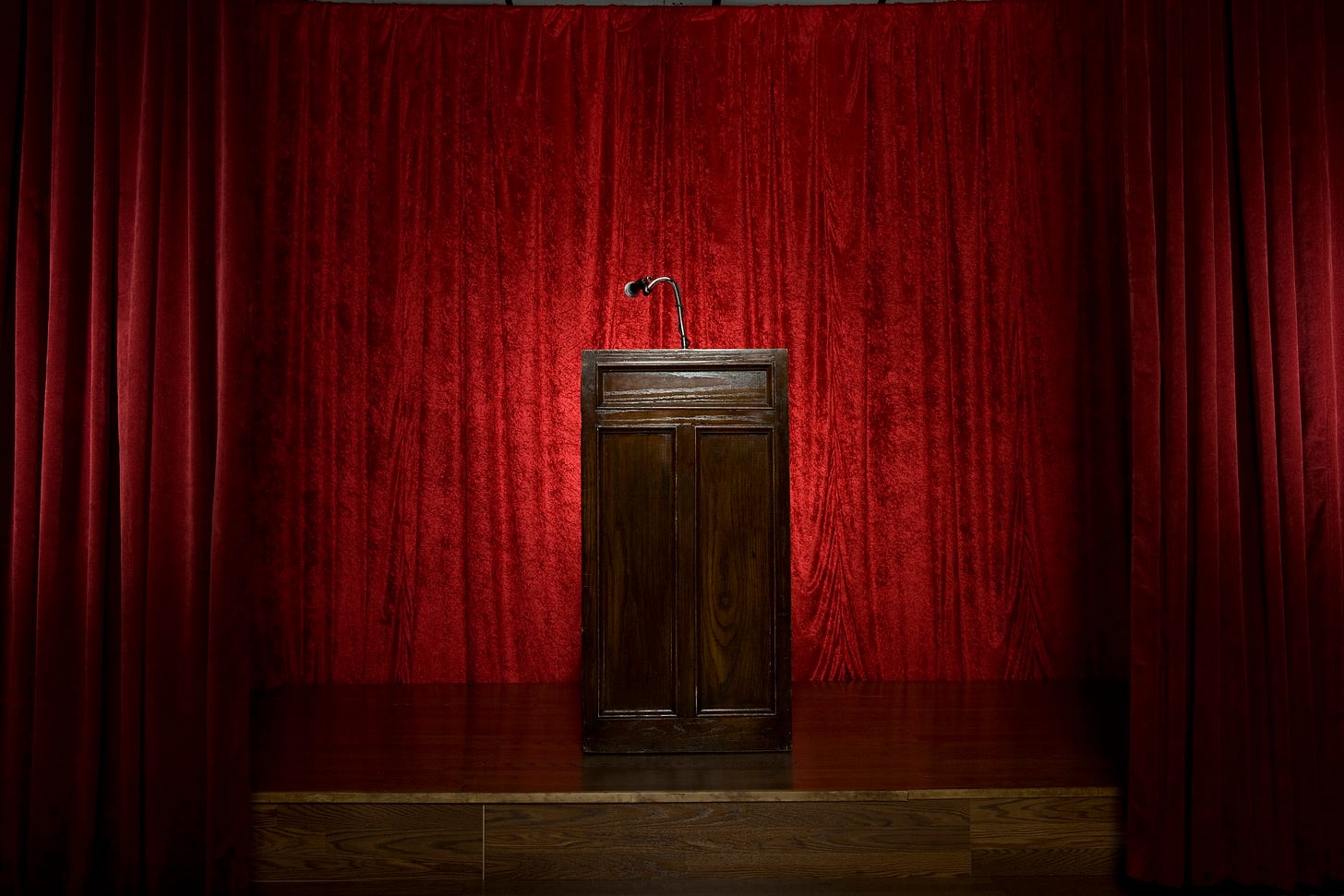Towering Inferno
Usually, I find the parade of stricken people interviewed during climate calamities blur after a while. Not this time.
There are few politicians who would want to be in Los Angeles Mayor Karen Bass’s blazing saddle right now. When the raging flames begin to cool, the fiery embers of political finger pointing that are already falling on her luckless head will entirely take over from the mesmerizing human stories that have filled our screens for the past week. Usually I find the parade of stricken people interviewed during climate calamities blur after a while. Not this time. When I turn on coverage of the Los Angeles inferno, I feel I am watching a modern dramatization of Nathanael West’s dark 1939 novel The Day of the Locust. It’s not the stories of the big celebs who lost their mansions that are so compelling but the curtain the fire has lifted on the unseen strata of the entertainment industry: the makeup artists, set builders, lighting and camera crews, and aspiring writers who have had to flee their wooden bungalows perched in mountain foothills or along twisty trails, people whose everyday challenges with getting and keeping work were always ameliorated by waking up to that warm winter sun and a shower of lemons in the backyard.
LA is such an unnatural construction, a dreamed-up dream factory plopped in the desert and sustained by water from nowhere, a man-made oasis where there never should have been one. People have imagined LA burning for a century or so, ever since the little town blossomed like some hothouse orchid into Babylon West. It's always seemed built on fairy dust, not on real industry, on people selling made-up stories told using made-up people. A story is by its nature ephemeral, and so it seemed must be the storytelling town itself — so un-city-like, a skein of neighborhoods built on a continental edge that might at any moment crack off and disappear into the Pacific Ocean. A certain crazed obsession with LA as the site of an apocalypse of fire — a desire to see flimsy pretension punished, somehow — seems part of the American imagination. The great California painter Ed Ruscha showed gas stations alight, LACMA going up in flames, partly as a joke on Romantic painting, partly out of curiosity: What would that look like? Now we know.
The main character in The Day of the Locust is a young painter working on a grotesque masterpiece called The Burning of Los Angeles. West’s apocalyptic vision ends in a riot and one wonders if ultimately that’s where we are headed too. All the displaced and undocumented domestic workers, tending the rich people’s now vanished pools, where will they go?
For the last four years, pundits have told us that a Trump second term will plunge us into authoritarianism, but that seems less likely now than a plunge into anarchy. How much disruption can a society endure? Mark Zuckerberg is positively festive about abandoning fact-checking at Meta, untroubled by opening the floodgates further for the cacophony of conspiracy theorists’ lies. As the Nobel Prize-winning Filipino media founder Maria Ressa said on Fareed Zakaria’s GPS show on Sunday, “Mark Zuckerberg has never really understood nor respected the role journalism plays. And Facebook became the world’s gatekeeper. And that’s part of the reason we’ve seen the corruption of our public information ecosystem.” In an unnerving op-ed in the FT by Peter Thiel about the casting off of what he calls the Distributed Idea Suppression Complex — old-school concepts of truth, probity, and societal norms — the tech billionaire declares, “There will be no reactionary restoration of the pre-internet past. The future demands fresh and strange ideas.” In the last pages of The Day of the Locust, Nathanael West’s painter protagonist does indeed see something new.
“Across the top, parallel with the frame, he had drawn the burning city, a great bonfire of architectural styles, ranging from Egyptian to Cape Cod colonial. Through the center, winding from left to right, was a long hill street and down it, spilling into the middle foreground, came the mob carrying baseball bats and torches.”
The question of 2025 is how willing people will be to see all they have loved and respected go up in flames.
Performance Anxiety
I have become increasingly baffled by people with zero communication skills -like Mayor Bass- who keep stubbornly running for office, and am even more baffled when they win. ( Cf British PM Sir Keir Starmer’s “loveless landslide,” which is now generating less love and more slide every day.) When Bass got off the plane in LA after that ill-advised trip to Ghana and was taxed with raucous questions by a reporter, she literally said nothing, seized up in tongue-tied paralysis before scuttling off to her car. As former Fox virago turned top Republican podcaster Megyn Kelly put it, “What the actual eff?”
In an era when every day provides a fresh unexpected criminal outrage, climate catastrophe, or disinformation debacle, if you have no performance game, please choose a different career. Your main job is being abIe to improvise under pressure in front of a camera. I recognize that these skills only certify a long career in politics if other things go according to plan. Former Governor Andrew Cuomo’s health bulletins to the citizenry of New York made him the heartthrob of the Covid era until #MeToo fiascos brought him so low he could hardly get a table in a Manhattan restaurant. Former New Jersey Governor Chris Christie, bulked up in his trademark fleece jacket and whipped by winds standing athwart the Jersey shoreline after Hurricane Sandy, was the surefire next president of the United States until the hubris of his office staff created “Bridgegate,” the political equivalent of revenge porn. And we need no reminding of Rudy Giuliani, dubbed America’s Mayor for his flawless communication skills after 9/11, who self-sabotaged into a flaccid, bankrupt punchline. But as Trump proves every day, the show’s the thing. Message to Democrats: If you can’t hold your own for three hours on the Joe Rogan Experience, I will spit thee out.
Dancing with Wolf
Some people turn to nature videos when they can’t sleep, lulled by the reassuring, BBC-trained voice of David Attenborough as an outsize blowfish stares you down through the camera. But for some sick reason, I have long found my most soothing nighttime sedative is viewing old episodes of Law & Order: SVU, created in 1999 by the mighty veteran producer Dick Wolf for NBC when network TV was king. I can scroll sleepily through the million and one past episodes asking myself: Rape or homicide? Pedophilia or kidnapping? (Nothing please with the more recent plotline involving Captain Olivia Benson’s heartfelt discovery of her inner maternal instincts, packing up the lunchbox of her boring, adopted 12-year-old son Noah, whom she saved from a sex trafficker.) Once selected, the grainy old tabloid crime stills — which remain peerless opening credits under a pounding beat, reedy clarinet, and baritone voice-over intoning, "In the criminal justice system, sexually based offenses are considered especially heinous. In New York City, the dedicated detectives who investigate these vicious felonies are members of an elite squad known as the Special Victims Unit. THESE are their stories.” — are, well, deeply comforting. It’s that sublime certainty of knowing that, from the moment the headless torso rolls out of the trash can, Mariska Hargitay’s Captain Benson and the reliably wise Fin Tutuola, played by Ice-T, have got this, and, in 43 minutes, will have it all wrapped up in court as I slide off into the Land of Nod.
So the news that the 78-year-old Dick Wolf, urged by his son Elliot, head of Wolf Entertainment’s digital output, is now experimenting with a new Amazon made-for-streaming police procedural comprised of 30-minute, linked-together episodes filled me with both excitement and consternation. Wolf might have produced one of the most lucrative franchises in the history of television, but in the post-cable binging era of the last 15 years, nothing could have been more old hat than this hoary hitmaker’s sew-it-up-in-one-episode, dead-body-on-a-sidewalk formula. Now, however, the streaming universe is experiencing the same chaos as everything else, and there is a new hunger for the Dick Wolf-style narrative order. His decision to adapt his old TV recipe into shorter dramatic bursts for post-Covid, attention-deficit audiences was, it turns out, a stroke of genius.
I found the first three episodes of On Call, his crazily fast-paced new series set in Long Beach, California (and co-written by Elliot Wolf) beyond fabulous. The new female cop lead, Traci Harmon, a tense, pointy-nosed perfectionist, and her hot male rookie trainee are soldered into their patrol car as they careen from one pandemonious confrontation to another. The show is so heart-poundingly satisfying that it is unfortunately no longer a reliable sedative. Fresh Hell Entertainment Rating: One Ambien star for On Call because it’s too electrifying to send me to sleep.







You are still the absolute best at titles, Ms. Brown!!
Fresh Hell is the best entertainment I've found in a long time.
So far as the ascendency of people like Bass and Trump it's not so baffling when so many people make ignorance a point of pride.